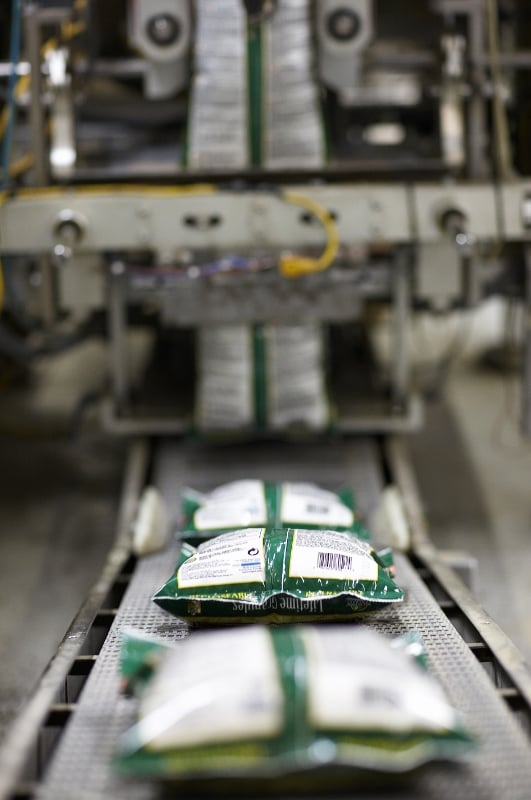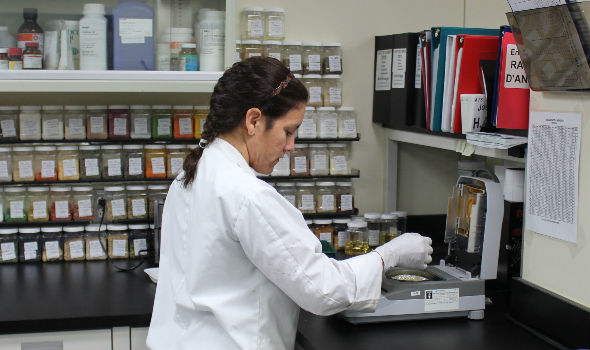
Quality Control Process
Food Safety: 3-step Quality Control Process
Before distribution, each batch of HARI product undergoes a strict and rigorous 3-step Quality Control process to ensure that consumers get safe, dependable and top quality bird food for their treasured feathered companions.
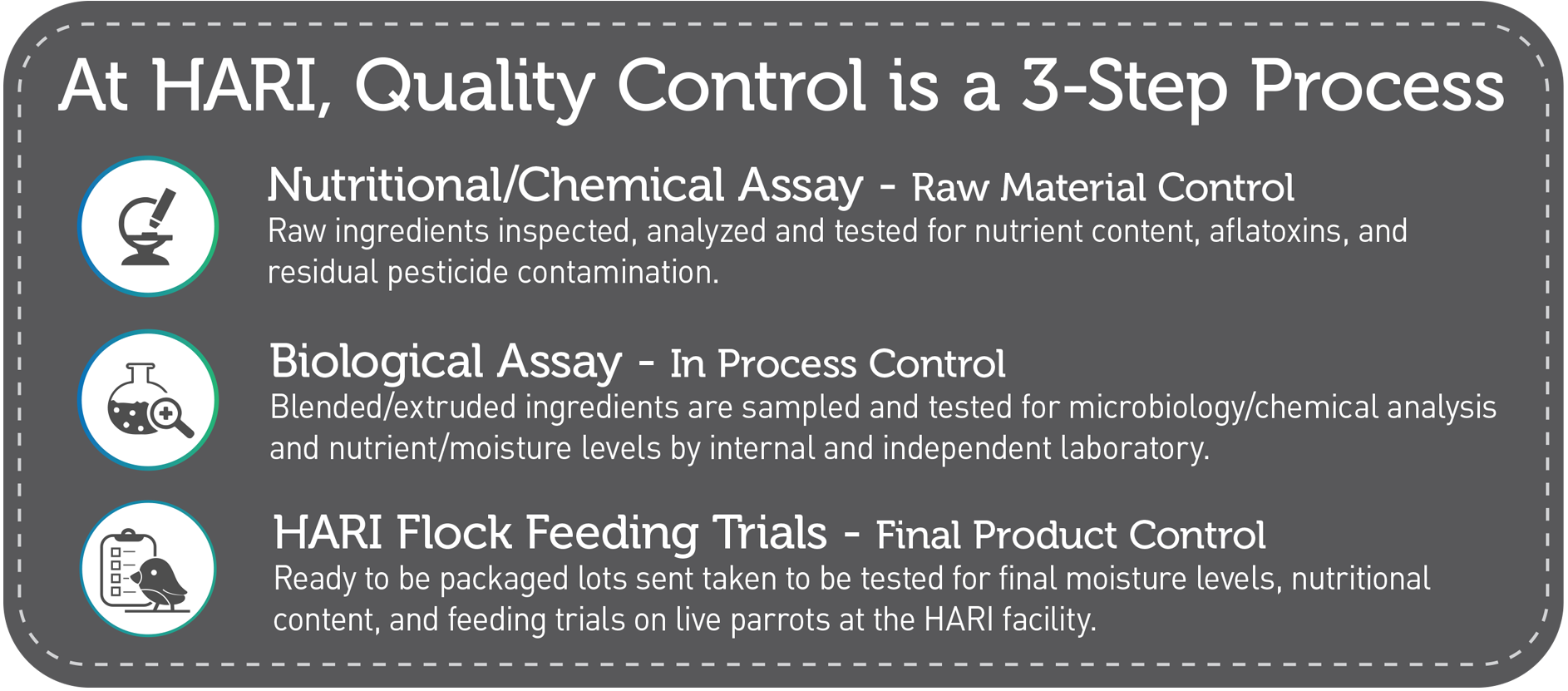
![]()
Nutritional/Chemical Assay – Raw Material Control
When ingredients are received at Hagen Industries (HI), the lot is quarantined until Quality Control (QC) releases it. The raw materials are sampled according to Canadian Grain Commission Sampling System Standard. They are inspected, analyzed and tested for nutrient content, aflatoxins (poisonous carcinogens that are produced by certain molds [Aspergillus flavus and Aspergillus parasiticus] which grow in soil, decaying vegetation, hay, and grains), and residual pesticide contamination.
 Biological Assay – In Process Control
Biological Assay – In Process Control
The ingredients are mixed/blended according to their specific written recipe formulas and then passed over rare earth magnets. In the case of extruded material, prior to grinding the ingredients, the raw materials pass through a metal detector and are then milled and thoroughly blended according to the formulations’ recipe.
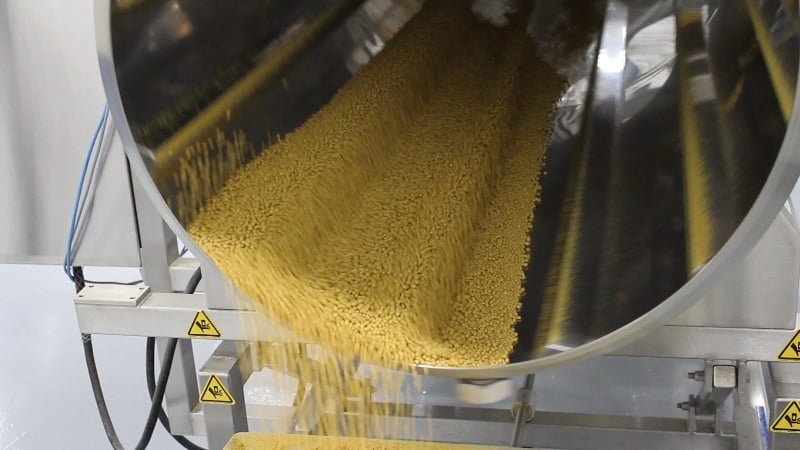
The final blend is then ready for the extrusion process. The formed kibble is cooked at a minimum core temperature of 90° C (194° F) to ensure harmful bacteria are killed. Core temperatures are logged throughout the process and reviewed by QC to ensure cooking temperature is reached and maintained during every extrusion run. To check for moisture and water activity, samples are taken and inspected at a minimum of once every hour. To reduce moisture levels and prevent mold growth, the kibble is then air-dried to an ambient temperature of 10° C (50° F).
The lot (seed mix and/or extruded formula) is then sampled to two laboratories: to an independent facility – for microbiology/chemical analysis, and to Hagen Industries’ internal facility – for analysis of key nutrients and moisture levels (verified with independent lab when required).
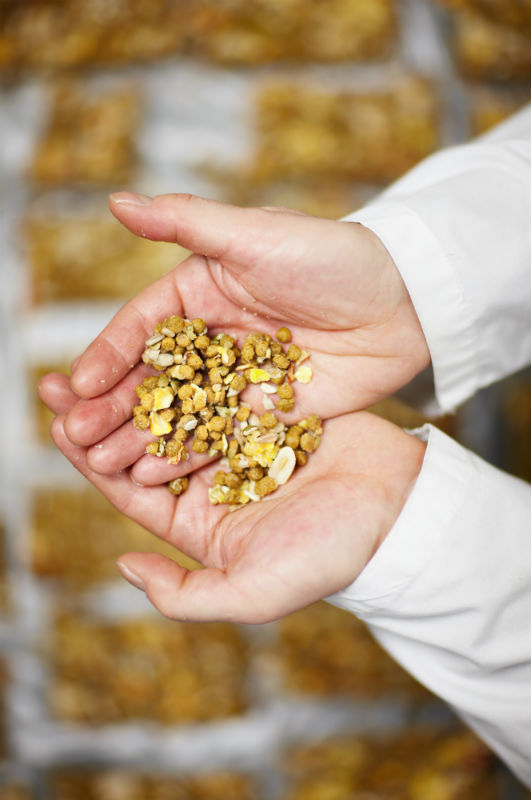
Product is put on hold until the results are reviewed and released by the QC department.
In the case of Hand Feeding Formula, the extruded kibble is then granulated with a dedicated vertical mill to its final mash form. Samples are taken every 20 minutes to ensure particle size distribution is within specifications, and viscosity building properties within range.
Upon completion of manufacturing, every batch of Tropican/Tropimix is tested in-house as well as with independent laboratories for moisture, protein, and fats to achieve the closest levels possible to the guaranteed analysis after biological variation in natural food crops. Samples held back during each stage of the production are kept for reference and added to the permanent stability program.
 HARI Flock Feeding Trials – Final Product Control
HARI Flock Feeding Trials – Final Product Control
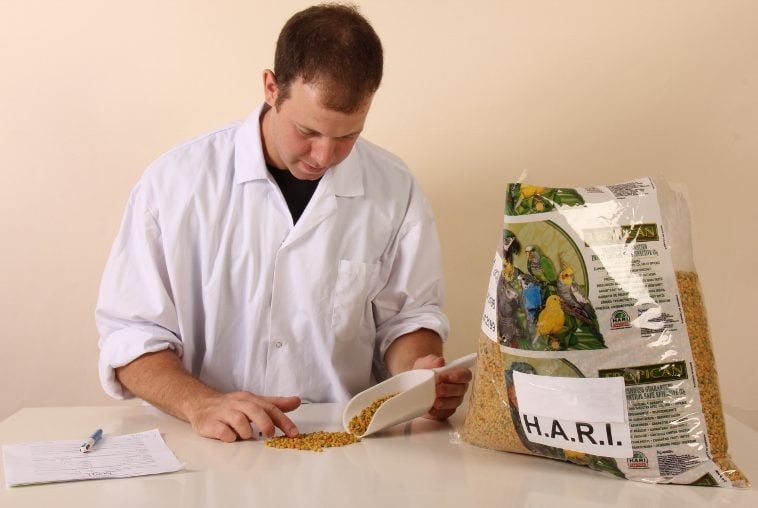
Samples of the now-ready-to-be-packaged kibble are put on hold again and are taken to be tested for final moisture levels, nutritional content, and feeding trials on live parrots at the HARI facility. Each lot sample that is sent to HARI arrives with its own certificate of analysis and is further documented with the date testing begins and the room/cage/individual parrot to take part in that feeding trial for that lot sample.
Bagging Production
Once samples are declared safe and released from hold the packaging lines are cleared, the first few bags are used to flush out any remaining components originating from previous product in the system. Once the bags are inspected for absence of contaminants, by the operator and QC, the production begins. The finished foods are packaged and CO2 gas flushed (a natural gas used to keep freshness in, maintain vitamin potency and inhibit insect growth [seed moths]). Bags are individually coded with a batch number and date to provide added quality assurance and traceability. Each individual package is then passed through a metal detector before finally leaving the facility.
Safeguarding the HARI Flock
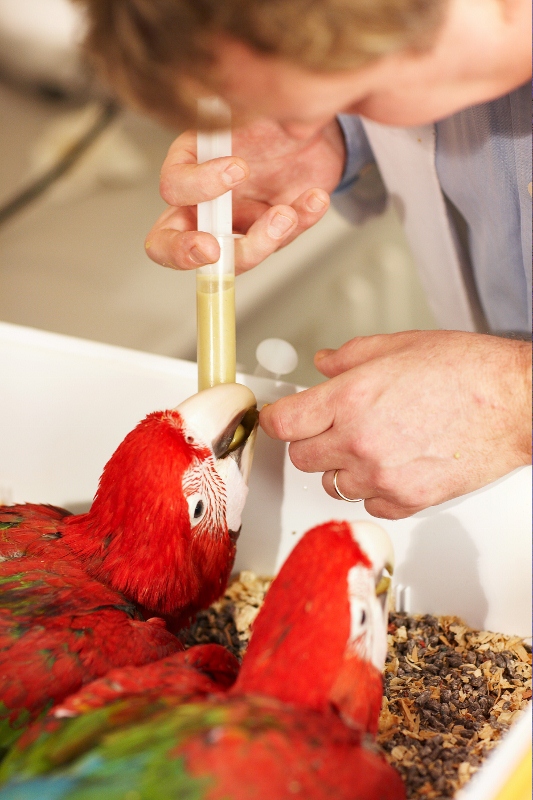 For the HARI feeding trials and quality control procedures to be carried out with minimum variability or interference to the flock, the HARI team ensures optimum hygiene of the cages, accessories and breeding rooms. The care provided to birds in the quality research and monitoring program is always maintained at an optimal level to avoid any ambiguity about the results obtained. It is important to note that under no circumstances are the physical and/or psychological well-being of a bird in the HARI flock affected by HARI quality assurance feeding trials. It is also important to note that the team also considers the specific needs and tastes of each bird before proceeding with any quality assurance tests.
For the HARI feeding trials and quality control procedures to be carried out with minimum variability or interference to the flock, the HARI team ensures optimum hygiene of the cages, accessories and breeding rooms. The care provided to birds in the quality research and monitoring program is always maintained at an optimal level to avoid any ambiguity about the results obtained. It is important to note that under no circumstances are the physical and/or psychological well-being of a bird in the HARI flock affected by HARI quality assurance feeding trials. It is also important to note that the team also considers the specific needs and tastes of each bird before proceeding with any quality assurance tests.
Prior to feeding the samples, the results of the microbiological analysis are double-verified to ensure that the samples can be safely consumed by the birds in the colony. Analysis results must show no presence of harmful bacteria such as E-coli and salmonella. The sample is inspected to ensure integrity has not been compromised during shipping; the general appearance of the product, the amount of dust and crumbs, the presence of products from another lot and/or the presence of any objects. Lastly, observations are noted about texture, colour, scent, shape, size, taste, etc.
Factors considered prior to giving samples
- species
- age
- health condition
- life-stage
- time of year
- environment
- ambient temperature
- preferences
During the feeding trial, observations are made and documented/photographed for each of the birds. If any findings are unusual or are cause for concern (i.e.. abnormal droppings, condition/appearance of the bird) the bird will be monitored and/or tested, and results will be provided to QC.
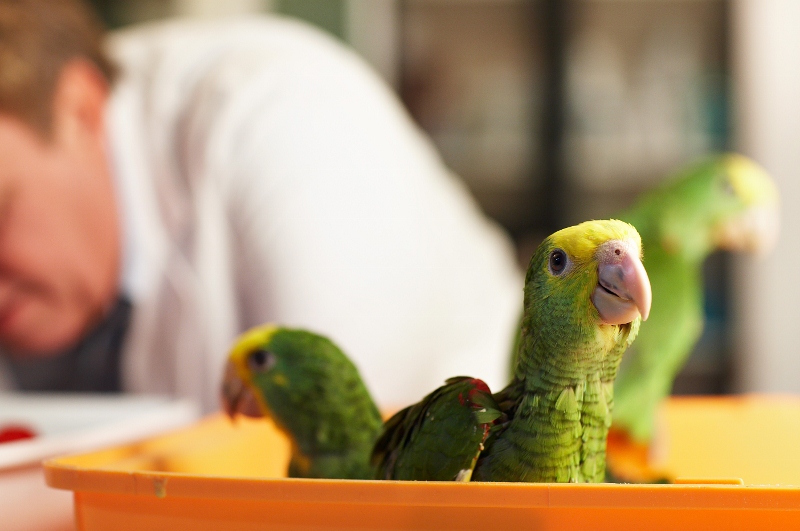
Safety Protocol
Reference samples of every batch are kept for the permanent stability program, export programs and for reference in case of concerns. They are kept for the entire shelf life of the products.
We know that no process is perfect, while we do our utmost with food safety and best practices, if an event were to occur where our food was in question, we would inform the public and work to correct any processes to ensure the safety of your feathered companion. In the event of illness of a HARI flock member taking part in a feeding trial, our avian veterinarian would be consulted directly. In the event of a death, a complete gross necropsy (with histopathology) would be requested to determine the exact cause of death. The sample would remain on hold until results would be obtained, and the food cleared.
| |



